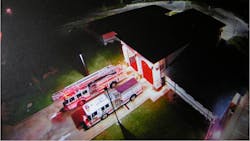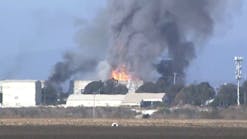On the evening of March 11, 2020, a T-22 from the Covington, GA, Fire Deptartment responded to an EMS assist call. While en route, the crew checked the MDT and found that they were responding to a lift assist, but they had no indication of the patient having a medical emergency of any kind.
The responding company was met outside the building by EMS who stated they only needed assistance lifting the patient off the floor and onto the stretcher. The rest of the EMS crew was still with the patient. Upon entering the scene, fire personnel overheard the EMS crew state that the patient's SPAO2 was “kind of low, let’s place her on a non-rebreather.”
Once this was heard, the company officer of T-22 immediately began asking the buzz questions: How long have you been ill? Are you or have you been running a fever? Have you traveled anywhere in the past 14 days?
What could be considered standard questions normally met with direct answers was all of a sudden met with hostility and side-stepping. Once the patient was loaded and EMS transported them to the ER, T-22 headed back to the station. However, something didn’t seem right, and upon arrival at the station the crew started decontaminating themselves and the apparatus.
At approximately 6:45 the following morning at shift change, hospital personnel called the company officer and advised that the patient had a respiratory infection that was not the flu. Immediately, the information was relayed to the shift commander and forwarded to the command staff. The Covington Fire Department placed the crews in quarantine until more information could be gathered by the Department of Public Health (DPH).
At 9:52 a.m., the DPH advised that the patient did not meet criteria and would not be tested and that all firefighters could return to normal duty. The decision was made to stay until the following morning just to make sure there were no changes in the patient’s condition or changes in recommendations from DPH. The day passed and all members were released to go home and later report on their next duty day. The natural tensions of the unknown were relieved, and everyone was excited to return home to their families.
The bad news
After reporting for duty on the next shift, the conversation turned to the next call and how things would be handled differently with more caution taken due to the possibility of exposure after learning that COVID-19 was in the area. The crew wanted to be certain it was taking the necessary precautions to avoid being placed in the same position again. Little did we know the events that were already unfolding across town at the local hospital. Around 10:30 p.m., we had a visit from the Fire Chief, Deputy Chief of Operations, and our Battalion Chief.
Immediately, our minds start spinning on all the possibilities of why they arrived so late at night: Who’s hurt? Who’s family is in need? What's going on? Then the news is delivered to us: The patient had tested positive for COVID-19. This was the first patient in our area confirmed to have the virus.
A flood of emotions welled up in every one of us from anger to fear to despair. We had gone home, so what about our families? Where are we supposed to go? We can’t take this back to our loves ones. Why did they not tell us what was going on with the patient? Why was there so much misinformation? This was a classic example of "fear of the unknown."
Support system
Fire Chief Jeremy Holmes decided to utilize the fire station that we were assigned as the location where we would be quarantined. There were sleeping quarters, showers, a kitchen, and plenty of activities to keep us occupied. Other crews assigned to the station would be detailed out to another station and make do with the space that was available.
The Covington Fire Department and local Emergency Management Agency did a tremendous job ensuring that all of our immediate needs were met by supplying necessities throughout the time we were to stay at the station. Our basic needs were met by the city manager and command staff, and other firefighters would often call to check on how we were doing and to see if there was anything they could help us or our families with. The Brotherhood is still strong within our department and it is one of the greatest things that I will take away from this event.
Quarantine
During our time in confinement we would take our vitals twice a day with a helping of apprehension due to not knowing what the readings would be. It became common place to wake up and take your temperature and do the same before going to bed—a habit that hasn’t quite left us.
The crew became very tight-knit. Luckily, it was a great group of guys that were able to get along and make the best of the unlucky hand that we were dealt. The days were made up of routine tasks. Monday was dedicated to the station, which was cleaned from top to bottom, the grass cut, and the yard cleaned as though it was a normal duty day. Tuesday was our truck day, and the remaining rig left in the building was an aging reserve quint that was checked and washed, while equipment was inventoried and cleaned as though it was the newest rig in the fleet.
The guys appreciated the work as it helped to pass the time. When there wasn’t a scheduled set of tasks for the day, it was time for training, physical fitness, and some administrative projects such as reviewing SOGs and creating flow charts for processes that were already in place. The evenings proved to be the most difficult when wives and children would want to say goodnight. Turning in early was often the norm as it would get us to the next day a little faster—at least that was what each of us hoped.
Lessons Learned
Though this process has been difficult at times, it has allowed our department and other agencies around us to learn from our situation. We are no longer taking any call for granted. When exact information is not readily available, we must make the best decisions available to protect our personnel regardless of the situation. Processes have been laid out for how to handle things if another crew becomes exposed. Another facility will be utilized so that the stations can remain open and ready for response.
The guidelines put in place by DPH are constantly changing, but the Covington Fire Department has followed them to the letter in an attempt to protect its personnel as best as possible.
The New Normal
Returning home to families with open arms finally came. Friends and neighbors called to ask the same questions we have answered a hundred times. We reported back to work wondering if it were to happen again, what would we do differently? What would we do when it happens again?
Take the precautions, follow the guidelines, and most importantly continue doing the job we all signed up for. All the while being a little more cautious and a little more aware of the dangers this "new normal" brings to our lives.






